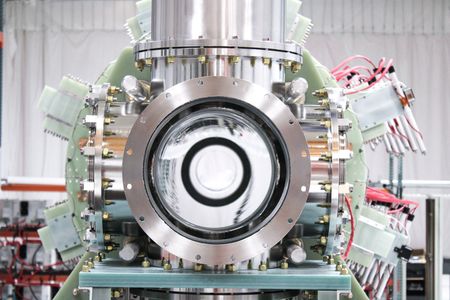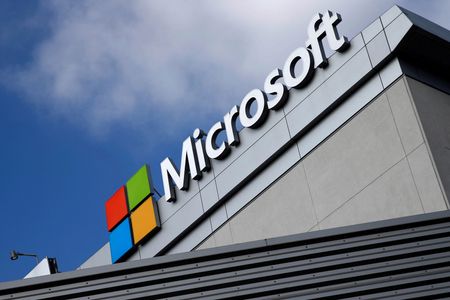By Timothy Gardner
WASHINGTON (Reuters) -Private U.S. nuclear fusion company Helion Energy will provide Microsoft with electricity in about five years, the companies said on Wednesday, in the first such deal for the power source that fuels the sun but has been elusive on Earth.
Government labs and more than 30 companies are racing to generate power from fusion, which could one day help the world slash emissions linked to climate change. Unlike today’s fission reactors, it could generate power without producing long-lasting radioactive waste.
Fusion occurs when two light atoms such as hydrogen, heated to extreme temperatures, fuse into one heavier atom, releasing large amounts of energy. So far, earthly fusion reactions have been momentary and suck up more energy than they release, but companies have raised about $5 billion in private funding in the quest to achieve net energy gain.
Helion’s plant is expected to be online by 2028 and will target power generation of 50 megawatts or greater after a one-year ramp-up period, it said. One megawatt can supply up to about 1,000 U.S. homes on a typical day.
“Fifty megawatts is a big first step of commercial-scale fusion, and the revenue feeds right back into us developing more power plants and getting fusion out on the grid both in the United States and internationally as fast as possible,” David Kirtley, Washington state-based Helion’s founder and CEO, said in an interview.
Polaris, Helion’s seventh-generation machine, should come online next year and demonstrate electricity generation, using pulsed high-power magnet technologies to achieve fusion, Kirtley said. In 2021, Helion was the first private company to achieve 100 million degrees Celsius (180 million degrees Fahrenheit) and the optimum temperature for fusion is about twice that, Kirtley said.
While many fusion companies are looking to tritium, a rare hydrogen isotope, to help fuel reactions, Helion plans to use Helium 3, a rare type of the gas used in quantum computing.
Helion has so far raised more than $570 million in private capital, with OpenAI CEO Sam Altman providing $375 million in 2021.
Brad Smith, vice chair and president at Microsoft Corp, said in a news release that Helion’s work “supports our own long-term clean energy goals and will advance the market to establish a new, efficient method for bringing more clean energy to the grid, faster.”
The companies did not disclose financial or timing details of the power purchase agreement, or which Microsoft facilities would get fusion-generated electricity.
Kimberly Budil, the head of the Lawrence Livermore National Laboratory, which is experimenting with fusion, said last December that a few decades of research and investment could put scientists in a position to build a power plant.
Helion still needs design and construction approvals from the Nuclear Regulatory Commission (NRC), as well as local permits. But the fusion industry was cheered by the NRC’s decision last month to separate fusion regulation from that of fission, a move backers say could reduce timelines for license approvals.
Andrew Holland, head of the Fusion Industry Association, said nothing about fusion has been easy and that the power purchase contract likely had clauses regarding the timing of the delivery of electricity. But he said the deal shows trust is building.
“The business world is starting to understand that fusion is coming and perhaps sooner than a lot of people thought,” Holland said in an interview. “It’s a vote of confidence that Helion is on its way, as are other companies building their proof-of-concept machines now.”
(Reporting by Timothy Gardner; Editing by Jacqueline Wong and Jonathan Oatis)

